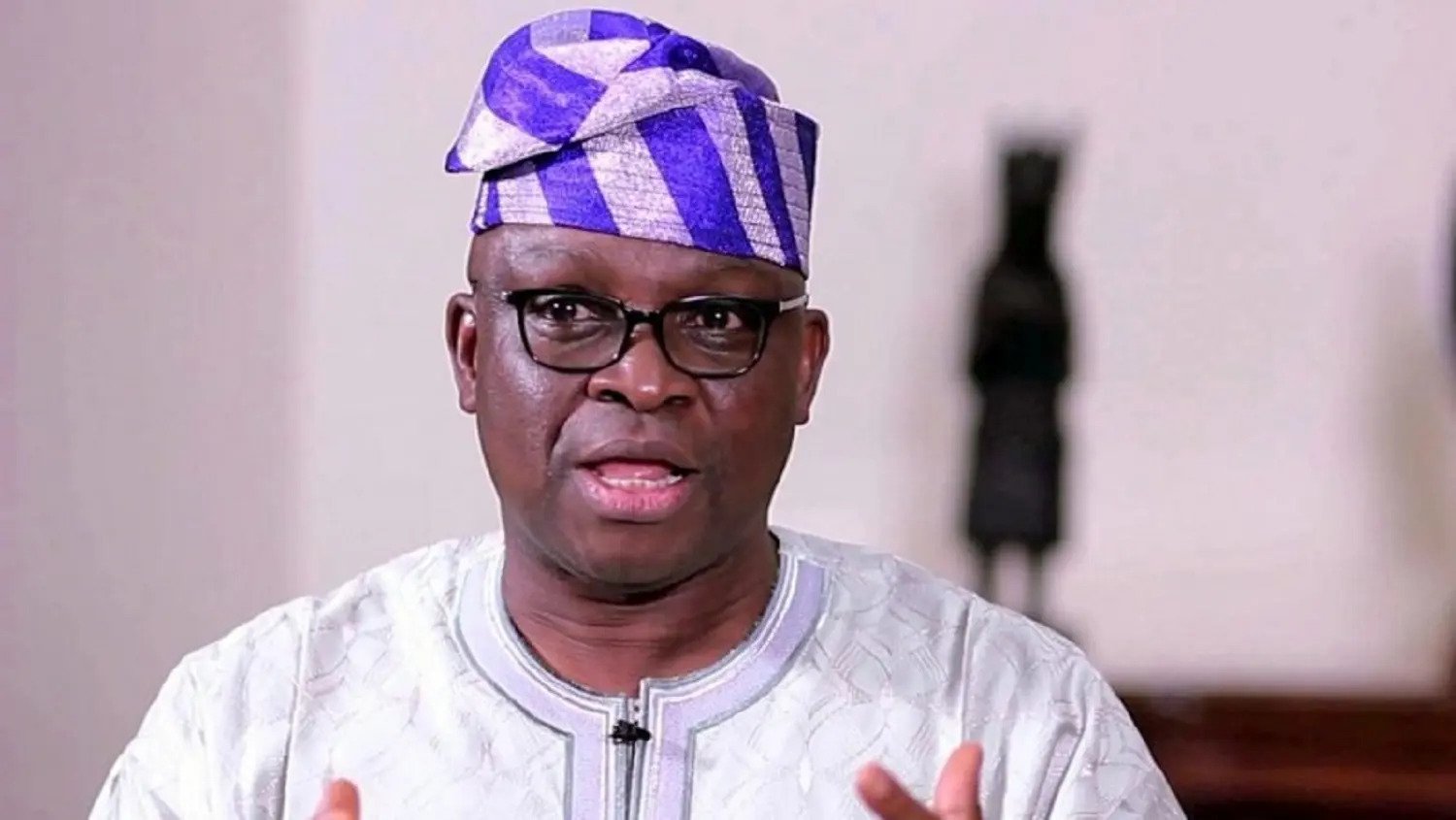Flashback: Fayose: The Fall And Triumph Of A General– By Maxwell Adeleye

In the words of William Shakespeare, a veteran writer and author of blessed memory, the wisest warrior is the one who runs away to re-oil his weakened artillery whenever he perceives being overpowered by superior enemies at the war front. That is, a foolish warrior is the one who stays at the war front to continue fighting a battle that is obviously unwinnable.
Retreating from a battle that one knows he cannot win is not an act of cowardice; it is the smartest path to success. A warrior who retreats from a battle today only to resurface at the war front tomorrow to continue from where he left off will be remembered for his intelligence and success, while an arrogant warrior who is foolishly defeated at the war front will be known for his imprudence.
On October 16, 2006, Ayodele, the scion of Fayose's dynasty of Afao-Ekiti, ran away from the political war front in Ekiti State, having sensed defeat at the hands of his political enemies.
God entrusted the sovereignty of Ekiti people into Fayose's hands in May 2003 to distribute the fruits of democratic governance to his people. However, he was controversially and unconstitutionally impeached in 2006 via the conspiracy of Ekiti Elites and a retired General from Ogun State.
A recap of his political journey will suffice. Nobody knew Fayose until he burst onto the political scene of Ekiti State in 2000 like a thief in the night. The then incumbent Governor, Otunba 'Niyi Adebayo, had not spent a year in office when Fayose stormed Ekiti with the inscription “Who is Fayose?” plastered in all the nooks and crannies of the state.
Affirmatively, the question on the lips of every conscious Ekiti person then was, who truly is Fayose? The Elites of Ekiti State considered him a tenderfoot, neophyte, and tyro and therefore never took him seriously. But in the blink of an eye, he became the talk of the town. From the North to the South, East, and West of Ekiti, Fayose was the major point of political discourse.
He defeated Chief S.K Babalola, who was the candidate strongly supported by then President Olusegun Obasanjo and the Elites in his party, the People's Democratic Party (PDP), at the governorship primaries. Also, Governor Adebayo never took him seriously until the results of the governorship election favored Fayose.
However, Fayose had not spent three months in office when some people, who considered themselves Ekiti intelligentsia, declared a maneuver warfare against him. His integrity was roundly criticized and massacred in the media by the opposition. In fact, some people outside Ekiti State considered associating with Fayose as the height of immorality.
An Ekiti-born Senior Advocate of Nigeria, Femi Falana, according to news reports, single-handedly submitted seventy-three petitions against Fayose to the Economic and Financial Crimes Commission (EFCC). A state reputed as the Fountain of Knowledge and the Land of Honour was turned into an Egypt by Fayose's political foes.
Ekiti was always in the news from May 2003 to October 2006 when Fayose held the reins of power for negative melodrama. It was violence for violence between Fayose's men and those after his job.
Conversely, after many twists and turns, a general was defeated on the battlefield. On October 16, 2003, Fayose was illegally impeached by the members of the state House of Assembly over offenses for which he had earlier been vindicated by the panel constituted by the state Chief Judge, Justice Kayode Bamisile.
Fayose was vilified and found guilty by a panel constituted by an unknown Judge, Justice Jide Aladejana, who was unlawfully appointed by the state House of Assembly as Chief Judge of the state to investigate Fayose.
Fayose was ousted from Oke Bareke Government House, Ado-Ekiti, via a civilian coup strongly supported by the Nigerian bourgeoisie. To compound his problems, Fayose was declared wanted by the EFCC after his impeachment for sleaze, gross misconduct, and maladministration.
Oh! A general fell on the war front, though he was not captured! His enemies jubilated while the poorest of the poor in Ekiti wailed. He ran for his life when he was defeated by the warriors of the earth to re-oil his weapons. He went into self-imposed exile in an unknown land.
For 15 months, nobody knew his whereabouts. His political hibernation was the talk of the town when he was invincible. His foes called him a coward, not knowing that he went into exile to reinvent, replan, and re-strategize.
On December 8th, 2007, the missing general resurfaced on the streets of Ado-Ekiti. The news of Fayose's appearance spread across the 120 towns and villages of Ekiti State and beyond within ten minutes.
He was welcomed by all and sundry across political divides. A few days after reappearing, he submitted himself for investigation and prosecution at the EFCC office in Ikoyi, Lagos. The third day after visiting the EFCC, he became a guest at Ikoyi prison.
He spent the Christmas and New Year yuletide of 2007 at Ikoyi maximum prison on the orders of Justice Abubakar of the Federal High Court sitting in Lagos. He was set free after spending 21 days in the cage of the almighty Goliaths of the nation of Nigeria. An attempt to further incarcerate him for trumped-up charges of murder in January 2008 was rejected by the people of Ekiti who stood against the move.
He left prison and joined the masses on the streets of Ekiti who were fighting against the illegal government of Engineer Segun Oni, which was imposed on Ekiti people in 2007 by Obasanjo. Fayose openly declared his support for Oni's challenger, Kayode Fayemi.
After over two years of titanic battle, the alliance between Fayose and Fayemi ousted Oni from government. Then, Ekiti people were happy that the saviors had arrived from Canaan land.
Fayose expected to be incorporated into Fayemi's government, but he got what he never bargained for. He was rejected by those he helped enthrone. He declared interest in the senatorial seat of Ekiti Central in 2011, but his once-upon-a-time political friends used the instrumentality of power and money to discredit him at the polls. Fayose was defeated again.
For the second time within a decade, Fayose went into political exile. For six months, nobody heard from Fayose. Nonetheless, he emerged stronger. He went back to reunite with his party members, the PDP, to rebuild their then-shattered house in Ekiti.
He was confronted by enemies within his party and conquered. In less than six months, he took over the structure of his party in Ekiti. Above all expectations, he was granted a waiver by his party to run for elective positions.
On March 27, 2014, Fayose won the ticket of his party to run for the Ekiti governorship seat for the second term. Just like in his first term, nobody took him seriously when he declared his ambition to govern Ekiti State again. He won the primaries of his party against all odds and traps set for him by enemies within and outside his party.
On June 21, 2014, the elitist government of Fayemi was democratically and lawfully dethroned at the polls by a populist. Fayemi, who had spent all his days in government formulating and implementing elitist policies, looked back and could not see the members of his class. The Elites could not leave the comfort of their hotel suites to stand in line under the sun. Only the commoners came to judgment, and they voted to restore their man back to government.
Ekiti people voted for Ayo Fayose again to resume from where he stopped in 2006. They voted for a leader high in ideas and lowly at heart. He overwhelmingly triumphed in all sixteen local government areas of the state.
His political foes publicly congratulated him after he defeated them at the polls, not knowing that they had plans to ensure he was not inaugurated. He was dragged to a court of competent jurisdiction to stop his inauguration on the grounds that he was not qualified to run for the seat he won on June 21, 2014, having been impeached in 2006.
Fayose sent his legal luminaries to court to defend him. Meanwhile, as the suit lingered, issues surfaced. When angry Ekiti people saw the suit against Fayose as an opportunity to steal their mandate, they brazenly invaded the temple of justice on September 26, 2014, and set their man free. What a sad occurrence!
On October 16, 2014, Fayose was inaugurated for another term. He was sworn in for another four-year term, but another trouble started within five weeks of his assumption of office. A battle of supremacy ensued between Fayose and the opposition-dominated members of the state House of Assembly.
The war saw the seven members of the house who are loyal to Fayose impeaching their Speaker, Adewale Omirin, who enjoyed and still enjoys the support of the remaining nineteen members of the house. The seven members loyal to Fayose took over the house, and the remaining nineteen sent themselves into self-imposed political exile.
However, the nineteen anti-Fayose members resumed on April 2nd, 2015, after almost four months in exile, to commence impeachment proceedings against Fayose. They resurfaced after the victory of General Muhammadu Buhari of their party, the All Progressives Congress (APC), in the March 28 presidential election.
The impeachment plots caused violent unrest in Ekiti. A young man, Temitope Olaiya, lost his life in the process. On April 11th, Ekiti people went to the polls again to deliver their judgment against the anti-Fayose lawmakers. All 26 assembly seats were won by Fayose's men.
On April 14th, 2015, a lingering case that started at the Election Petition Tribunal in Ado-Ekiti, through to the appellate Court, seeking the nullification of Fayose's victory on June 21, 2014, on the allegation that he was not qualified to run for any public position having been impeached in 2006, was decided at the Supreme Court in favor of Fayose.
The Apex court ruled that Fayose was never impeached in 2006 because the Chief Judge who constituted the panel that found the Governor guilty of impeachable offenses was an impersonator, and therefore, any function carried out by the panel is null and void.
The cloudy atmosphere that had pervaded Ekiti ever since the forceful exit of Fayose on October 16, 2006, was finally blown away by the Supreme Court on April 14, 2015. The Judge who was the pawn used by desperate politicians to circumvent the mandate freely given to Fayose by the people of Ekiti in 2006, remained suspended by the National Judicial Council (NJC) for gross misconduct.
The fall and triumph of Fayose are lessons to all politically inclined young souls. No matter how long, light will always triumph over darkness.
Previously published by: The Nigerian Voice



